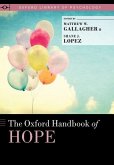Oxford Handbook of Happiness
Herausgegeben von David, Susan; Boniwell, Ilona; Conley Ayers, Amanda
Oxford Handbook of Happiness
Herausgegeben von David, Susan; Boniwell, Ilona; Conley Ayers, Amanda
- Broschiertes Buch
- Merkliste
- Auf die Merkliste
- Bewerten Bewerten
- Teilen
- Produkt teilen
- Produkterinnerung
- Produkterinnerung
In recent decades there has been a shift in focus from psychological and social problems-what might be called the "dark side" of humanity-to human well-being and flourishing. The Positive Psychology movement, along with changes in attitudes toward organisational and societal health, has generated a surge of interest in human happiness. The Oxford Handbook of Happiness is the definitive text for researchers and practitioners interested in human happiness. Its editors and chapter contributors are world leaders in the investigation of happiness across the fields of psychology, organizational…mehr
Andere Kunden interessierten sich auch für
![Oxford Handbook of Language Production Oxford Handbook of Language Production]() Matthew GoldrickOxford Handbook of Language Production209,99 €
Matthew GoldrickOxford Handbook of Language Production209,99 €![Oxford Handbook of Work and Aging Oxford Handbook of Work and Aging]() Oxford Handbook of Work and Aging261,99 €
Oxford Handbook of Work and Aging261,99 €![Oxford Handbook of Personality Disorders Oxford Handbook of Personality Disorders]() Oxford Handbook of Personality Disorders273,99 €
Oxford Handbook of Personality Disorders273,99 €![The Oxford Handbook of Memory The Oxford Handbook of Memory]() Endel Tulving / Fergus I. M. Craik (eds.)The Oxford Handbook of Memory82,99 €
Endel Tulving / Fergus I. M. Craik (eds.)The Oxford Handbook of Memory82,99 €![Oxford Handbook of the Development of Play Oxford Handbook of the Development of Play]() Oxford Handbook of the Development of Play63,99 €
Oxford Handbook of the Development of Play63,99 €![Oxford Handbook of Media Psychology Oxford Handbook of Media Psychology]() Oxford Handbook of Media Psychology91,99 €
Oxford Handbook of Media Psychology91,99 €![The Oxford Handbook of Hope The Oxford Handbook of Hope]() The Oxford Handbook of Hope189,99 €
The Oxford Handbook of Hope189,99 €-
-
-
In recent decades there has been a shift in focus from psychological and social problems-what might be called the "dark side" of humanity-to human well-being and flourishing. The Positive Psychology movement, along with changes in attitudes toward organisational and societal health, has generated a surge of interest in human happiness.
The Oxford Handbook of Happiness is the definitive text for researchers and practitioners interested in human happiness. Its editors and chapter contributors are world leaders in the investigation of happiness across the fields of psychology, organizational behaviour, education, philosophy, social policy and economics.
The study of happiness is at the nexus of four major scientific developments: the growing field of Positive Psychology which researches the conditions that make people flourish; advances in the biological and affective sciences which have contributed to the understanding of positive emotions; Positive Organizational Scholarship, an emerging discipline aimed at investigating and fostering excellence in organisations; and findings from economics indicating that traditional markers of economic and
societal well-being are insufficient. The Oxford Handbook of Happiness offers readers a coherent, multi-disciplinary, and accessible text on the current state-of-the-art in happiness research.
This volume features ten sections that focus on psychological, philosophical, evolutionary, economic and spiritual approaches to happiness; happiness in society, education, organisations and relationships; and the assessment and development of happiness. Readers will find information on psychological constructs such as resilience, flow, and emotional intelligence; theories including broaden-and-build and self-determination; and explorations of topics including collective virtuousness,
psychological capital, coaching, environmental sustainability and economic growth. This handbook will be useful to academics, practitioners, teachers, students, and all those interested in theory and research on human happiness.
Hinweis: Dieser Artikel kann nur an eine deutsche Lieferadresse ausgeliefert werden.
The Oxford Handbook of Happiness is the definitive text for researchers and practitioners interested in human happiness. Its editors and chapter contributors are world leaders in the investigation of happiness across the fields of psychology, organizational behaviour, education, philosophy, social policy and economics.
The study of happiness is at the nexus of four major scientific developments: the growing field of Positive Psychology which researches the conditions that make people flourish; advances in the biological and affective sciences which have contributed to the understanding of positive emotions; Positive Organizational Scholarship, an emerging discipline aimed at investigating and fostering excellence in organisations; and findings from economics indicating that traditional markers of economic and
societal well-being are insufficient. The Oxford Handbook of Happiness offers readers a coherent, multi-disciplinary, and accessible text on the current state-of-the-art in happiness research.
This volume features ten sections that focus on psychological, philosophical, evolutionary, economic and spiritual approaches to happiness; happiness in society, education, organisations and relationships; and the assessment and development of happiness. Readers will find information on psychological constructs such as resilience, flow, and emotional intelligence; theories including broaden-and-build and self-determination; and explorations of topics including collective virtuousness,
psychological capital, coaching, environmental sustainability and economic growth. This handbook will be useful to academics, practitioners, teachers, students, and all those interested in theory and research on human happiness.
Hinweis: Dieser Artikel kann nur an eine deutsche Lieferadresse ausgeliefert werden.
Produktdetails
- Produktdetails
- Oxford Library of Psychology
- Verlag: Oxford University Press
- Seitenzahl: 1104
- Erscheinungstermin: 13. April 2014
- Englisch
- Abmessung: 249mm x 172mm x 68mm
- Gewicht: 1930g
- ISBN-13: 9780198714620
- ISBN-10: 0198714629
- Artikelnr.: 40485648
- Herstellerkennzeichnung
- Libri GmbH
- Europaallee 1
- 36244 Bad Hersfeld
- gpsr@libri.de
- Oxford Library of Psychology
- Verlag: Oxford University Press
- Seitenzahl: 1104
- Erscheinungstermin: 13. April 2014
- Englisch
- Abmessung: 249mm x 172mm x 68mm
- Gewicht: 1930g
- ISBN-13: 9780198714620
- ISBN-10: 0198714629
- Artikelnr.: 40485648
- Herstellerkennzeichnung
- Libri GmbH
- Europaallee 1
- 36244 Bad Hersfeld
- gpsr@libri.de
Susan David, Co-director, Institute of Coaching, McLean Hospital, Harvard Medical School, USA Clinical Instructor in Psychology, Department of Psychiatry, Harvard Medical School, USA Director, Evidence Based Psychology, USA, Ilona Boniwell, Programme Leader, Applied Positive Psychology, University of East London, UK, Amanda Conley Ayers, Research Associate, Evidence Based Psychology, USA
* 1: Susan A. David, Ilona Boniwell, and Amanda Conley Ayers
: Introduction
* Section 1: Psychological Approaches to Happiness
* 2: Joar Vittersø: Introduction to Psychological Approaches to
Happiness
* 3: Anne M. Conway, Michele M. Tugade, Lahnna I. Catalino, and Barbara
L. Fredrickson: The Broaden-and-Build Theory of Positive Emotions:
Form, Function and Mechanisms
* 4: Dale Griffin and Richard Gonzalez: The Endowment-Contrast Model: A
Lens for Happiness Research
* 5: Antonella Delle Fave: Past, Present and Future of Flow
* 6: Alia J. Crum and Peter Salovey: Emotionally Intelligent Happiness
* 7: David G. Myers: Religious Engagement and Well-Being
* 8: Patty Ferssizidis, Todd B. Kashdan, Rachel A. Marquart, and
Michael F. Steger: Positive Psychological Experiences and
Psychopathology: A Self-Regulatory Perspective
* 9: Katherine Jacobs Bao and Sonja Lyubomirsky: The Rewards of
Happiness
* 10: William Pavot and Ed Diener
: Happiness Experienced: The Science of Subjective Well-Being
*
* Section 2: Psychological Definitions of Happiness
* 11: Joar Vittersø: Introduction to Psychological Definitions Of
Happiness
* 12: Ruut Veenhoven: Notions of the Good Life
* 13: Felicity F. Miao, Minkyung Koo, and Shigehiro Oishi: Subjective
Well-Being
* 14: Robert A. Cummins: Measuring Happiness and Subjective Well-Being
* 15: Veronika Huta: Eudaimonia
* 16: Christopher P. Niemiec and Richard M. Ryan: What Makes for a Life
Well Lived?: Autonomy and its relation to full functioning and
organismic wellness
* 17: Joar Vittersø
: Functional Well-Being: Happiness as feelings, evaluations, and
functioning
*
* Section 3: Philosophical Approaches to Happiness
* 18: James O. Pawelski: Introduction to Philosophical Approaches to
Happiness
* 19: Darrin M. McMahon: The Pursuit of Happiness in History
* 20: Philip J. Ivanhoe: Happiness in Early Chinese Thought
* 21: Emmy van Deurzen: Continental Contributions to our Understanding
of Happiness and Suffering
* 22: Raymond Angelo Belliotti: The Seductions of Happiness
* 23: Daniel M. Haybron: The Nature and Significance of Happiness
* 24: Valerie Tiberius: Philosophical Methods in Happiness Research
* 25: James O. Pawelski
: Happiness and its Opposites
*
* Section 4: Spiritual Approaches to Happiness
* 26: Jane Henry: Introduction to Spiritual Approaches to Happiness
* 27: Matthieu Ricard: A Buddhist View of Happiness
* 28: Maurits G.T. Kwee: Relational Buddhism: An integrative psychology
of happiness amidst existential suffering
* 29: Kiran Kumar K. Salagame: Well-being from the Hindu/Sanãtana
Dharma Perspective
* 30: Peter Malinowski: Flourishing Through Meditation and Mindfulness
* 31: Annette Mahoney, Kenneth I. Pargament, and Krystal M. Hernandez:
Heaven on Earth: beneficial effects of sanctification for individual
and interpersonal wll-being
* 32: Jane Henry
: Quieting the Mind and Low Arousal Routes to Happiness
*
* Section 5: Happiness and Society
* 33: Sam Thompson: Introduction to Happiness and Society
* 34: Bruno S. Frey and Alois Stutzer: Economics and the Study of
Individual Happiness
* 35: William Tov and Evelyn W.M. Au: Comparing Well-Being Across
Nations: Conceptual and empirical issues
* 36: Dimitris Ballas and Danny Dorling: The Geography of Happiness
* 37: Aaron Ahuvia and Elif Izberk-Bilgin: Well-Being in Consumer
Societies
* 38: Sam Thompson, Nic Marks, and Tim Jackson: Well-being and
Sustainable Development
* 39: Geoff Mulgan
: Well-being and Public Policy
*
* Section 6: Positive Education
* Introduction to Positive Education
* 41: John White: Education and Well-being
* 42: Nash Popovic: Should Education have Happiness Lessons?
* 43: Toni Noble and Helen McGrath: Wellbeing and Resilience in
Education
* 44: Jennifer M. Fox Eades, Carmel Proctor, and Martin Ashley:
Happiness in the Classroom
* 45: Laura McInerney: Applying Happiness and Well-Being Research to
the Teaching and Learning Process
* 46: Jane E. Gillham, Rachel M. Abenavoli, Steven M. Brunwasser, Karen
J. Reivich, and Martin E.P. Seligman: Resilience Education
* 47: Robert J. Sternberg: Teaching for Wisdom
* 48: Ian Morris: Going Beyond the Accidental: Happiness, education,
and the Wellington College Experience
* 49: Matthew A. White: Positive Education at Geelong Grammar School
* Section 7: Happiness and Organizations
* 50: Arran Caza and Kim Cameron: An Introduction to Happiness and
Organizations
* 51: Kim S. Cameron and Arran Caza: Virtuousness as a Source of
Happiness in Organizations
* 52: Brianna Caza and Amy Wrzesniewski: How Work Shapes Well-Being
* 53: Ben J. Searle and Sharon K. Parker: Work Design and Happiness: An
Active, Reciprocal Perspective
* 54: Peter Warr: Jobs and Job-Holders: Two Sources of Happiness and
Unhappiness
* 55: Carolyn M. Youssef and Fred Luthans: Managing Psychological
Capital in Organizations: Cognitive, affective, conative and social
mechanisms of happiness
* 56: Laura Morgan Roberts: Reflected Best Self Engagement at Work:
Positive identity, alignment, and the pursuit of vitality and value
creation
* 57: Thomas A. Wright: Encouraging Employee Happiness
* 58: James Campbell Quick and Jonathan D. Quick: Executive Well-Being
* Section 8: Relationships and Happiness
*
* 59: Meliksah Demir: Introduction to Relationships and Happiness
* 60: Shimon Saphire-Bernstein and Shelley E. Taylor: Close
Relationships and Happiness
* 61: Mario Mikulincer and Phillip R. Shaver: Adult Attachment and
Happiness: Individual differences in the experience and consequences
of positive emotions
* 62: Brian Lakey: Perceived Social Support and Happiness: The role of
personality and relational processes
* 63: Meliksah Demir, Haley Orthel, and Adrian Keith Andelin:
Friendship and happiness
* Section 9: Development, Stability and Change of Happiness
* 64: Kate Hefferon: Introduction to Development, Stability and Change
of Happiness
* 65: Sarah E. Hill, Danielle J. DelPriore, and Brett Major: An
Evolutionary Psychological Perspective on Happiness
* 66: Bruce Headey: Set-Point Theory May Now Need Replacing: Death of a
paradigm?
* 67: Kennon M. Sheldon, Julia Boehm, and Sonja Lyubomirsky: Variety is
the Spice of Happiness: The hedonic adaptation prevention (HAP) model
* 68: Corey L.M. Keyes: Promotion and Protection of Positive Mental
Health: Towards complete mental health in human development
* 69: Stephen Joseph and Kate Hefferon: Post-traumatic Growth:
Eudaimonic Happiness in the Aftermath of Adversity
* 70: Michael F. Steger, Anna Beeby, Samantha Garrett, and Todd B.
Kashdan
: Creating a Stable Architectural Framework of Existence: Proposing a
Model of Lifelong Meaning
* Section 10: Happiness Interventions
* 71: Gordon B. Spence and Suzy Green: Introduction to Happiness
Interventions
* 72: Acacia C. Parks, Stephen M. Schueller, and Arber Tasimi:
Increasing Happiness in the General Population: Empirically Supported
Self-Help?
* 73: Tayyab Rashid: Positive Psychology in Practice: Positive
psychotherapy
* 74: Louise Hayes: Happiness in Valued Living: Acceptance and
commitment therapy as a model for change
* 75: Gordon B. Spence and Anthony M. Grant: Coaching and Well-Being: A
brief review of existing evidence, relevant theory and implications
for practitioners
* 76: Laura M. Hsu, and Ellen J. Langer: Mindfulness and Cultivating
Well-Being in Older Adults
* 77: Giovanni A. Fava and Chiara Ruini: Well-Being Therapy:
Theoretical background, clinical implications and future directions
* 78: Lindsay G. Oades, Trevor P. Crowe and Frank P. Deane: The
Collaborative Recovery Model: Developing positive institutions to
facilitate recovery in enduring mental illness
* 79: Susan A. David, Ilona Boniwell, and Amanda Conley Ayers:
Conclusion: The future of happiness
: Introduction
* Section 1: Psychological Approaches to Happiness
* 2: Joar Vittersø: Introduction to Psychological Approaches to
Happiness
* 3: Anne M. Conway, Michele M. Tugade, Lahnna I. Catalino, and Barbara
L. Fredrickson: The Broaden-and-Build Theory of Positive Emotions:
Form, Function and Mechanisms
* 4: Dale Griffin and Richard Gonzalez: The Endowment-Contrast Model: A
Lens for Happiness Research
* 5: Antonella Delle Fave: Past, Present and Future of Flow
* 6: Alia J. Crum and Peter Salovey: Emotionally Intelligent Happiness
* 7: David G. Myers: Religious Engagement and Well-Being
* 8: Patty Ferssizidis, Todd B. Kashdan, Rachel A. Marquart, and
Michael F. Steger: Positive Psychological Experiences and
Psychopathology: A Self-Regulatory Perspective
* 9: Katherine Jacobs Bao and Sonja Lyubomirsky: The Rewards of
Happiness
* 10: William Pavot and Ed Diener
: Happiness Experienced: The Science of Subjective Well-Being
*
* Section 2: Psychological Definitions of Happiness
* 11: Joar Vittersø: Introduction to Psychological Definitions Of
Happiness
* 12: Ruut Veenhoven: Notions of the Good Life
* 13: Felicity F. Miao, Minkyung Koo, and Shigehiro Oishi: Subjective
Well-Being
* 14: Robert A. Cummins: Measuring Happiness and Subjective Well-Being
* 15: Veronika Huta: Eudaimonia
* 16: Christopher P. Niemiec and Richard M. Ryan: What Makes for a Life
Well Lived?: Autonomy and its relation to full functioning and
organismic wellness
* 17: Joar Vittersø
: Functional Well-Being: Happiness as feelings, evaluations, and
functioning
*
* Section 3: Philosophical Approaches to Happiness
* 18: James O. Pawelski: Introduction to Philosophical Approaches to
Happiness
* 19: Darrin M. McMahon: The Pursuit of Happiness in History
* 20: Philip J. Ivanhoe: Happiness in Early Chinese Thought
* 21: Emmy van Deurzen: Continental Contributions to our Understanding
of Happiness and Suffering
* 22: Raymond Angelo Belliotti: The Seductions of Happiness
* 23: Daniel M. Haybron: The Nature and Significance of Happiness
* 24: Valerie Tiberius: Philosophical Methods in Happiness Research
* 25: James O. Pawelski
: Happiness and its Opposites
*
* Section 4: Spiritual Approaches to Happiness
* 26: Jane Henry: Introduction to Spiritual Approaches to Happiness
* 27: Matthieu Ricard: A Buddhist View of Happiness
* 28: Maurits G.T. Kwee: Relational Buddhism: An integrative psychology
of happiness amidst existential suffering
* 29: Kiran Kumar K. Salagame: Well-being from the Hindu/Sanãtana
Dharma Perspective
* 30: Peter Malinowski: Flourishing Through Meditation and Mindfulness
* 31: Annette Mahoney, Kenneth I. Pargament, and Krystal M. Hernandez:
Heaven on Earth: beneficial effects of sanctification for individual
and interpersonal wll-being
* 32: Jane Henry
: Quieting the Mind and Low Arousal Routes to Happiness
*
* Section 5: Happiness and Society
* 33: Sam Thompson: Introduction to Happiness and Society
* 34: Bruno S. Frey and Alois Stutzer: Economics and the Study of
Individual Happiness
* 35: William Tov and Evelyn W.M. Au: Comparing Well-Being Across
Nations: Conceptual and empirical issues
* 36: Dimitris Ballas and Danny Dorling: The Geography of Happiness
* 37: Aaron Ahuvia and Elif Izberk-Bilgin: Well-Being in Consumer
Societies
* 38: Sam Thompson, Nic Marks, and Tim Jackson: Well-being and
Sustainable Development
* 39: Geoff Mulgan
: Well-being and Public Policy
*
* Section 6: Positive Education
* Introduction to Positive Education
* 41: John White: Education and Well-being
* 42: Nash Popovic: Should Education have Happiness Lessons?
* 43: Toni Noble and Helen McGrath: Wellbeing and Resilience in
Education
* 44: Jennifer M. Fox Eades, Carmel Proctor, and Martin Ashley:
Happiness in the Classroom
* 45: Laura McInerney: Applying Happiness and Well-Being Research to
the Teaching and Learning Process
* 46: Jane E. Gillham, Rachel M. Abenavoli, Steven M. Brunwasser, Karen
J. Reivich, and Martin E.P. Seligman: Resilience Education
* 47: Robert J. Sternberg: Teaching for Wisdom
* 48: Ian Morris: Going Beyond the Accidental: Happiness, education,
and the Wellington College Experience
* 49: Matthew A. White: Positive Education at Geelong Grammar School
* Section 7: Happiness and Organizations
* 50: Arran Caza and Kim Cameron: An Introduction to Happiness and
Organizations
* 51: Kim S. Cameron and Arran Caza: Virtuousness as a Source of
Happiness in Organizations
* 52: Brianna Caza and Amy Wrzesniewski: How Work Shapes Well-Being
* 53: Ben J. Searle and Sharon K. Parker: Work Design and Happiness: An
Active, Reciprocal Perspective
* 54: Peter Warr: Jobs and Job-Holders: Two Sources of Happiness and
Unhappiness
* 55: Carolyn M. Youssef and Fred Luthans: Managing Psychological
Capital in Organizations: Cognitive, affective, conative and social
mechanisms of happiness
* 56: Laura Morgan Roberts: Reflected Best Self Engagement at Work:
Positive identity, alignment, and the pursuit of vitality and value
creation
* 57: Thomas A. Wright: Encouraging Employee Happiness
* 58: James Campbell Quick and Jonathan D. Quick: Executive Well-Being
* Section 8: Relationships and Happiness
*
* 59: Meliksah Demir: Introduction to Relationships and Happiness
* 60: Shimon Saphire-Bernstein and Shelley E. Taylor: Close
Relationships and Happiness
* 61: Mario Mikulincer and Phillip R. Shaver: Adult Attachment and
Happiness: Individual differences in the experience and consequences
of positive emotions
* 62: Brian Lakey: Perceived Social Support and Happiness: The role of
personality and relational processes
* 63: Meliksah Demir, Haley Orthel, and Adrian Keith Andelin:
Friendship and happiness
* Section 9: Development, Stability and Change of Happiness
* 64: Kate Hefferon: Introduction to Development, Stability and Change
of Happiness
* 65: Sarah E. Hill, Danielle J. DelPriore, and Brett Major: An
Evolutionary Psychological Perspective on Happiness
* 66: Bruce Headey: Set-Point Theory May Now Need Replacing: Death of a
paradigm?
* 67: Kennon M. Sheldon, Julia Boehm, and Sonja Lyubomirsky: Variety is
the Spice of Happiness: The hedonic adaptation prevention (HAP) model
* 68: Corey L.M. Keyes: Promotion and Protection of Positive Mental
Health: Towards complete mental health in human development
* 69: Stephen Joseph and Kate Hefferon: Post-traumatic Growth:
Eudaimonic Happiness in the Aftermath of Adversity
* 70: Michael F. Steger, Anna Beeby, Samantha Garrett, and Todd B.
Kashdan
: Creating a Stable Architectural Framework of Existence: Proposing a
Model of Lifelong Meaning
* Section 10: Happiness Interventions
* 71: Gordon B. Spence and Suzy Green: Introduction to Happiness
Interventions
* 72: Acacia C. Parks, Stephen M. Schueller, and Arber Tasimi:
Increasing Happiness in the General Population: Empirically Supported
Self-Help?
* 73: Tayyab Rashid: Positive Psychology in Practice: Positive
psychotherapy
* 74: Louise Hayes: Happiness in Valued Living: Acceptance and
commitment therapy as a model for change
* 75: Gordon B. Spence and Anthony M. Grant: Coaching and Well-Being: A
brief review of existing evidence, relevant theory and implications
for practitioners
* 76: Laura M. Hsu, and Ellen J. Langer: Mindfulness and Cultivating
Well-Being in Older Adults
* 77: Giovanni A. Fava and Chiara Ruini: Well-Being Therapy:
Theoretical background, clinical implications and future directions
* 78: Lindsay G. Oades, Trevor P. Crowe and Frank P. Deane: The
Collaborative Recovery Model: Developing positive institutions to
facilitate recovery in enduring mental illness
* 79: Susan A. David, Ilona Boniwell, and Amanda Conley Ayers:
Conclusion: The future of happiness
* 1: Susan A. David, Ilona Boniwell, and Amanda Conley Ayers
: Introduction
* Section 1: Psychological Approaches to Happiness
* 2: Joar Vittersø: Introduction to Psychological Approaches to
Happiness
* 3: Anne M. Conway, Michele M. Tugade, Lahnna I. Catalino, and Barbara
L. Fredrickson: The Broaden-and-Build Theory of Positive Emotions:
Form, Function and Mechanisms
* 4: Dale Griffin and Richard Gonzalez: The Endowment-Contrast Model: A
Lens for Happiness Research
* 5: Antonella Delle Fave: Past, Present and Future of Flow
* 6: Alia J. Crum and Peter Salovey: Emotionally Intelligent Happiness
* 7: David G. Myers: Religious Engagement and Well-Being
* 8: Patty Ferssizidis, Todd B. Kashdan, Rachel A. Marquart, and
Michael F. Steger: Positive Psychological Experiences and
Psychopathology: A Self-Regulatory Perspective
* 9: Katherine Jacobs Bao and Sonja Lyubomirsky: The Rewards of
Happiness
* 10: William Pavot and Ed Diener
: Happiness Experienced: The Science of Subjective Well-Being
*
* Section 2: Psychological Definitions of Happiness
* 11: Joar Vittersø: Introduction to Psychological Definitions Of
Happiness
* 12: Ruut Veenhoven: Notions of the Good Life
* 13: Felicity F. Miao, Minkyung Koo, and Shigehiro Oishi: Subjective
Well-Being
* 14: Robert A. Cummins: Measuring Happiness and Subjective Well-Being
* 15: Veronika Huta: Eudaimonia
* 16: Christopher P. Niemiec and Richard M. Ryan: What Makes for a Life
Well Lived?: Autonomy and its relation to full functioning and
organismic wellness
* 17: Joar Vittersø
: Functional Well-Being: Happiness as feelings, evaluations, and
functioning
*
* Section 3: Philosophical Approaches to Happiness
* 18: James O. Pawelski: Introduction to Philosophical Approaches to
Happiness
* 19: Darrin M. McMahon: The Pursuit of Happiness in History
* 20: Philip J. Ivanhoe: Happiness in Early Chinese Thought
* 21: Emmy van Deurzen: Continental Contributions to our Understanding
of Happiness and Suffering
* 22: Raymond Angelo Belliotti: The Seductions of Happiness
* 23: Daniel M. Haybron: The Nature and Significance of Happiness
* 24: Valerie Tiberius: Philosophical Methods in Happiness Research
* 25: James O. Pawelski
: Happiness and its Opposites
*
* Section 4: Spiritual Approaches to Happiness
* 26: Jane Henry: Introduction to Spiritual Approaches to Happiness
* 27: Matthieu Ricard: A Buddhist View of Happiness
* 28: Maurits G.T. Kwee: Relational Buddhism: An integrative psychology
of happiness amidst existential suffering
* 29: Kiran Kumar K. Salagame: Well-being from the Hindu/Sanãtana
Dharma Perspective
* 30: Peter Malinowski: Flourishing Through Meditation and Mindfulness
* 31: Annette Mahoney, Kenneth I. Pargament, and Krystal M. Hernandez:
Heaven on Earth: beneficial effects of sanctification for individual
and interpersonal wll-being
* 32: Jane Henry
: Quieting the Mind and Low Arousal Routes to Happiness
*
* Section 5: Happiness and Society
* 33: Sam Thompson: Introduction to Happiness and Society
* 34: Bruno S. Frey and Alois Stutzer: Economics and the Study of
Individual Happiness
* 35: William Tov and Evelyn W.M. Au: Comparing Well-Being Across
Nations: Conceptual and empirical issues
* 36: Dimitris Ballas and Danny Dorling: The Geography of Happiness
* 37: Aaron Ahuvia and Elif Izberk-Bilgin: Well-Being in Consumer
Societies
* 38: Sam Thompson, Nic Marks, and Tim Jackson: Well-being and
Sustainable Development
* 39: Geoff Mulgan
: Well-being and Public Policy
*
* Section 6: Positive Education
* Introduction to Positive Education
* 41: John White: Education and Well-being
* 42: Nash Popovic: Should Education have Happiness Lessons?
* 43: Toni Noble and Helen McGrath: Wellbeing and Resilience in
Education
* 44: Jennifer M. Fox Eades, Carmel Proctor, and Martin Ashley:
Happiness in the Classroom
* 45: Laura McInerney: Applying Happiness and Well-Being Research to
the Teaching and Learning Process
* 46: Jane E. Gillham, Rachel M. Abenavoli, Steven M. Brunwasser, Karen
J. Reivich, and Martin E.P. Seligman: Resilience Education
* 47: Robert J. Sternberg: Teaching for Wisdom
* 48: Ian Morris: Going Beyond the Accidental: Happiness, education,
and the Wellington College Experience
* 49: Matthew A. White: Positive Education at Geelong Grammar School
* Section 7: Happiness and Organizations
* 50: Arran Caza and Kim Cameron: An Introduction to Happiness and
Organizations
* 51: Kim S. Cameron and Arran Caza: Virtuousness as a Source of
Happiness in Organizations
* 52: Brianna Caza and Amy Wrzesniewski: How Work Shapes Well-Being
* 53: Ben J. Searle and Sharon K. Parker: Work Design and Happiness: An
Active, Reciprocal Perspective
* 54: Peter Warr: Jobs and Job-Holders: Two Sources of Happiness and
Unhappiness
* 55: Carolyn M. Youssef and Fred Luthans: Managing Psychological
Capital in Organizations: Cognitive, affective, conative and social
mechanisms of happiness
* 56: Laura Morgan Roberts: Reflected Best Self Engagement at Work:
Positive identity, alignment, and the pursuit of vitality and value
creation
* 57: Thomas A. Wright: Encouraging Employee Happiness
* 58: James Campbell Quick and Jonathan D. Quick: Executive Well-Being
* Section 8: Relationships and Happiness
*
* 59: Meliksah Demir: Introduction to Relationships and Happiness
* 60: Shimon Saphire-Bernstein and Shelley E. Taylor: Close
Relationships and Happiness
* 61: Mario Mikulincer and Phillip R. Shaver: Adult Attachment and
Happiness: Individual differences in the experience and consequences
of positive emotions
* 62: Brian Lakey: Perceived Social Support and Happiness: The role of
personality and relational processes
* 63: Meliksah Demir, Haley Orthel, and Adrian Keith Andelin:
Friendship and happiness
* Section 9: Development, Stability and Change of Happiness
* 64: Kate Hefferon: Introduction to Development, Stability and Change
of Happiness
* 65: Sarah E. Hill, Danielle J. DelPriore, and Brett Major: An
Evolutionary Psychological Perspective on Happiness
* 66: Bruce Headey: Set-Point Theory May Now Need Replacing: Death of a
paradigm?
* 67: Kennon M. Sheldon, Julia Boehm, and Sonja Lyubomirsky: Variety is
the Spice of Happiness: The hedonic adaptation prevention (HAP) model
* 68: Corey L.M. Keyes: Promotion and Protection of Positive Mental
Health: Towards complete mental health in human development
* 69: Stephen Joseph and Kate Hefferon: Post-traumatic Growth:
Eudaimonic Happiness in the Aftermath of Adversity
* 70: Michael F. Steger, Anna Beeby, Samantha Garrett, and Todd B.
Kashdan
: Creating a Stable Architectural Framework of Existence: Proposing a
Model of Lifelong Meaning
* Section 10: Happiness Interventions
* 71: Gordon B. Spence and Suzy Green: Introduction to Happiness
Interventions
* 72: Acacia C. Parks, Stephen M. Schueller, and Arber Tasimi:
Increasing Happiness in the General Population: Empirically Supported
Self-Help?
* 73: Tayyab Rashid: Positive Psychology in Practice: Positive
psychotherapy
* 74: Louise Hayes: Happiness in Valued Living: Acceptance and
commitment therapy as a model for change
* 75: Gordon B. Spence and Anthony M. Grant: Coaching and Well-Being: A
brief review of existing evidence, relevant theory and implications
for practitioners
* 76: Laura M. Hsu, and Ellen J. Langer: Mindfulness and Cultivating
Well-Being in Older Adults
* 77: Giovanni A. Fava and Chiara Ruini: Well-Being Therapy:
Theoretical background, clinical implications and future directions
* 78: Lindsay G. Oades, Trevor P. Crowe and Frank P. Deane: The
Collaborative Recovery Model: Developing positive institutions to
facilitate recovery in enduring mental illness
* 79: Susan A. David, Ilona Boniwell, and Amanda Conley Ayers:
Conclusion: The future of happiness
: Introduction
* Section 1: Psychological Approaches to Happiness
* 2: Joar Vittersø: Introduction to Psychological Approaches to
Happiness
* 3: Anne M. Conway, Michele M. Tugade, Lahnna I. Catalino, and Barbara
L. Fredrickson: The Broaden-and-Build Theory of Positive Emotions:
Form, Function and Mechanisms
* 4: Dale Griffin and Richard Gonzalez: The Endowment-Contrast Model: A
Lens for Happiness Research
* 5: Antonella Delle Fave: Past, Present and Future of Flow
* 6: Alia J. Crum and Peter Salovey: Emotionally Intelligent Happiness
* 7: David G. Myers: Religious Engagement and Well-Being
* 8: Patty Ferssizidis, Todd B. Kashdan, Rachel A. Marquart, and
Michael F. Steger: Positive Psychological Experiences and
Psychopathology: A Self-Regulatory Perspective
* 9: Katherine Jacobs Bao and Sonja Lyubomirsky: The Rewards of
Happiness
* 10: William Pavot and Ed Diener
: Happiness Experienced: The Science of Subjective Well-Being
*
* Section 2: Psychological Definitions of Happiness
* 11: Joar Vittersø: Introduction to Psychological Definitions Of
Happiness
* 12: Ruut Veenhoven: Notions of the Good Life
* 13: Felicity F. Miao, Minkyung Koo, and Shigehiro Oishi: Subjective
Well-Being
* 14: Robert A. Cummins: Measuring Happiness and Subjective Well-Being
* 15: Veronika Huta: Eudaimonia
* 16: Christopher P. Niemiec and Richard M. Ryan: What Makes for a Life
Well Lived?: Autonomy and its relation to full functioning and
organismic wellness
* 17: Joar Vittersø
: Functional Well-Being: Happiness as feelings, evaluations, and
functioning
*
* Section 3: Philosophical Approaches to Happiness
* 18: James O. Pawelski: Introduction to Philosophical Approaches to
Happiness
* 19: Darrin M. McMahon: The Pursuit of Happiness in History
* 20: Philip J. Ivanhoe: Happiness in Early Chinese Thought
* 21: Emmy van Deurzen: Continental Contributions to our Understanding
of Happiness and Suffering
* 22: Raymond Angelo Belliotti: The Seductions of Happiness
* 23: Daniel M. Haybron: The Nature and Significance of Happiness
* 24: Valerie Tiberius: Philosophical Methods in Happiness Research
* 25: James O. Pawelski
: Happiness and its Opposites
*
* Section 4: Spiritual Approaches to Happiness
* 26: Jane Henry: Introduction to Spiritual Approaches to Happiness
* 27: Matthieu Ricard: A Buddhist View of Happiness
* 28: Maurits G.T. Kwee: Relational Buddhism: An integrative psychology
of happiness amidst existential suffering
* 29: Kiran Kumar K. Salagame: Well-being from the Hindu/Sanãtana
Dharma Perspective
* 30: Peter Malinowski: Flourishing Through Meditation and Mindfulness
* 31: Annette Mahoney, Kenneth I. Pargament, and Krystal M. Hernandez:
Heaven on Earth: beneficial effects of sanctification for individual
and interpersonal wll-being
* 32: Jane Henry
: Quieting the Mind and Low Arousal Routes to Happiness
*
* Section 5: Happiness and Society
* 33: Sam Thompson: Introduction to Happiness and Society
* 34: Bruno S. Frey and Alois Stutzer: Economics and the Study of
Individual Happiness
* 35: William Tov and Evelyn W.M. Au: Comparing Well-Being Across
Nations: Conceptual and empirical issues
* 36: Dimitris Ballas and Danny Dorling: The Geography of Happiness
* 37: Aaron Ahuvia and Elif Izberk-Bilgin: Well-Being in Consumer
Societies
* 38: Sam Thompson, Nic Marks, and Tim Jackson: Well-being and
Sustainable Development
* 39: Geoff Mulgan
: Well-being and Public Policy
*
* Section 6: Positive Education
* Introduction to Positive Education
* 41: John White: Education and Well-being
* 42: Nash Popovic: Should Education have Happiness Lessons?
* 43: Toni Noble and Helen McGrath: Wellbeing and Resilience in
Education
* 44: Jennifer M. Fox Eades, Carmel Proctor, and Martin Ashley:
Happiness in the Classroom
* 45: Laura McInerney: Applying Happiness and Well-Being Research to
the Teaching and Learning Process
* 46: Jane E. Gillham, Rachel M. Abenavoli, Steven M. Brunwasser, Karen
J. Reivich, and Martin E.P. Seligman: Resilience Education
* 47: Robert J. Sternberg: Teaching for Wisdom
* 48: Ian Morris: Going Beyond the Accidental: Happiness, education,
and the Wellington College Experience
* 49: Matthew A. White: Positive Education at Geelong Grammar School
* Section 7: Happiness and Organizations
* 50: Arran Caza and Kim Cameron: An Introduction to Happiness and
Organizations
* 51: Kim S. Cameron and Arran Caza: Virtuousness as a Source of
Happiness in Organizations
* 52: Brianna Caza and Amy Wrzesniewski: How Work Shapes Well-Being
* 53: Ben J. Searle and Sharon K. Parker: Work Design and Happiness: An
Active, Reciprocal Perspective
* 54: Peter Warr: Jobs and Job-Holders: Two Sources of Happiness and
Unhappiness
* 55: Carolyn M. Youssef and Fred Luthans: Managing Psychological
Capital in Organizations: Cognitive, affective, conative and social
mechanisms of happiness
* 56: Laura Morgan Roberts: Reflected Best Self Engagement at Work:
Positive identity, alignment, and the pursuit of vitality and value
creation
* 57: Thomas A. Wright: Encouraging Employee Happiness
* 58: James Campbell Quick and Jonathan D. Quick: Executive Well-Being
* Section 8: Relationships and Happiness
*
* 59: Meliksah Demir: Introduction to Relationships and Happiness
* 60: Shimon Saphire-Bernstein and Shelley E. Taylor: Close
Relationships and Happiness
* 61: Mario Mikulincer and Phillip R. Shaver: Adult Attachment and
Happiness: Individual differences in the experience and consequences
of positive emotions
* 62: Brian Lakey: Perceived Social Support and Happiness: The role of
personality and relational processes
* 63: Meliksah Demir, Haley Orthel, and Adrian Keith Andelin:
Friendship and happiness
* Section 9: Development, Stability and Change of Happiness
* 64: Kate Hefferon: Introduction to Development, Stability and Change
of Happiness
* 65: Sarah E. Hill, Danielle J. DelPriore, and Brett Major: An
Evolutionary Psychological Perspective on Happiness
* 66: Bruce Headey: Set-Point Theory May Now Need Replacing: Death of a
paradigm?
* 67: Kennon M. Sheldon, Julia Boehm, and Sonja Lyubomirsky: Variety is
the Spice of Happiness: The hedonic adaptation prevention (HAP) model
* 68: Corey L.M. Keyes: Promotion and Protection of Positive Mental
Health: Towards complete mental health in human development
* 69: Stephen Joseph and Kate Hefferon: Post-traumatic Growth:
Eudaimonic Happiness in the Aftermath of Adversity
* 70: Michael F. Steger, Anna Beeby, Samantha Garrett, and Todd B.
Kashdan
: Creating a Stable Architectural Framework of Existence: Proposing a
Model of Lifelong Meaning
* Section 10: Happiness Interventions
* 71: Gordon B. Spence and Suzy Green: Introduction to Happiness
Interventions
* 72: Acacia C. Parks, Stephen M. Schueller, and Arber Tasimi:
Increasing Happiness in the General Population: Empirically Supported
Self-Help?
* 73: Tayyab Rashid: Positive Psychology in Practice: Positive
psychotherapy
* 74: Louise Hayes: Happiness in Valued Living: Acceptance and
commitment therapy as a model for change
* 75: Gordon B. Spence and Anthony M. Grant: Coaching and Well-Being: A
brief review of existing evidence, relevant theory and implications
for practitioners
* 76: Laura M. Hsu, and Ellen J. Langer: Mindfulness and Cultivating
Well-Being in Older Adults
* 77: Giovanni A. Fava and Chiara Ruini: Well-Being Therapy:
Theoretical background, clinical implications and future directions
* 78: Lindsay G. Oades, Trevor P. Crowe and Frank P. Deane: The
Collaborative Recovery Model: Developing positive institutions to
facilitate recovery in enduring mental illness
* 79: Susan A. David, Ilona Boniwell, and Amanda Conley Ayers:
Conclusion: The future of happiness








